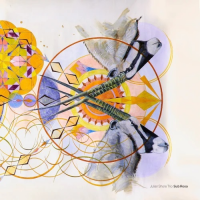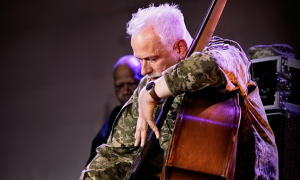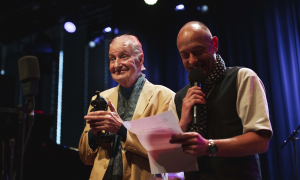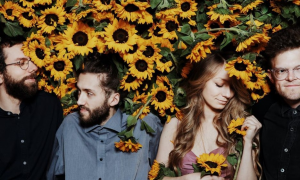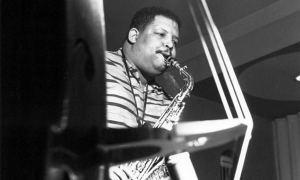Home » Jazz Articles » Profile » A Brief Guide To Lebanese Jazz
A Brief Guide To Lebanese Jazz
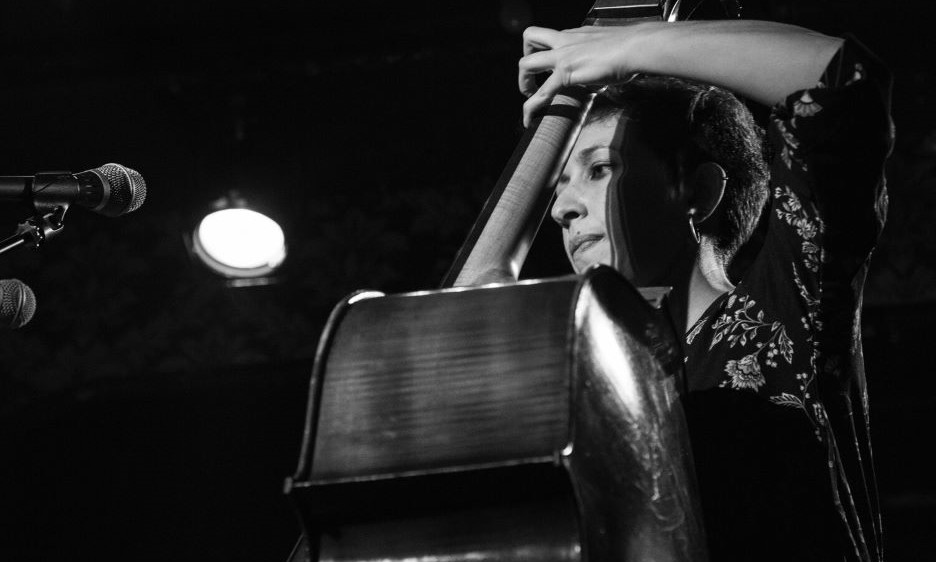
Courtesy Sally Mire
Coming from a country constantly forcing us to live day by day, our drive is to convey emotions of the present moment.
—Bonne Chose
It is a country renowned for its love of art and culture. Music is everywhere. Singer Fairouz, one of the most famous and instantly recognizable of Arabic voices since the early '50s, is still queen. Pop and rock are highly popular though jazz is played in many locales throughout Beirut, often against the background of eating, drinking and talking.
Background noise at a gig is perhaps the least of Lebanese jazz musicians' worries. The county's internal political strife and its vicious socio-economic consequences are an ever-present debilitating reality, while decades-long regional conflict has driven Palestinian, Iraqi and Syrian refugees in their droves into Lebanon.
Conflict with Israel—history repeating itself time and time again—has inflicted severe suffering and hardship on the population. Corruption, inequality, sectarianism, economic crisis and fighting plague a country where the majority of ordinary, hard-working Lebanese just want to live a dignified life. As the poet Khalil Gibran put it: "You have your Lebanon, and I have my Lebanon."
Lebanese jazz musicians may be small in number but there are some exceptional talents and singular voices that refuse to be silenced, even in the most difficult of times. That said, when Lebanon is embroiled in war all concerts grind to a halt and the only teaching—and nearly all jazz musicians teach in some capacity—is done online. A precarious occupation at the best of times becomes nigh impossible. Some musicians are displaced. Some choose exile.
This is not meant to be an exhaustive guide to Lebanese jazz, but rather a guide to some of the most interesting active jazz musicians. A few of the names are internationally known. Other names may be unfamiliar but are deserving of wider exposure.
Rabi Abou-Khalil
Oud player/composer
Rabih Abou-Khalil
oudb.1957

Frank Zappa
guitar, electric1940 - 1993

Thelonious Monk
piano1917 - 1982
Abou-Khalil has released two dozen albums featuring the likes of

Sonny Fortune
saxophone, alto1939 - 2018

Glen Moore
bass, acousticb.1941

Kenny Wheeler
flugelhorn1930 - 2014

Charlie Mariano
saxophone, alto1923 - 2009

Steve Swallow
bassb.1940

Joachim Kuhn
pianob.1944

Dave Bargeron
tromboneb.1942
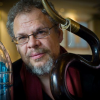
Michel Godard
tubaIbrahim Maalouf
Trumpeter
Ibrahim Maalouf
trumpetb.1980
Maalouf's father invented a four-valve micro-tonal trumpet that enabled Ibrahim to play Arabic maqams. "The invention of my father was way more than an extra valve on the trumpet playing quarter tones," Maalouf told Sidran. "It was more like a bridge between the cultures that I loved."
Maalouf's versatility has seen him collaborate with musicians as varied as

Archie Shepp
saxophone, tenorb.1937

Wynton Marsalis
trumpetb.1961

Melody Gardot
guitar and vocalsb.1985

Larry Grenadier
bass, acousticb.1966

Clarence Penn
drumsb.1968

Frank Woeste
piano
Mark Turner
saxophone, tenorb.1965
Arthur Satyan
One musician who went the other way and emigrated to Beirut is Armenian pianist
Arthur Satyan
pianob.1973
Satyan has taught many of young generation of Lebanese jazz musicians now making their way in the world. "Every year I help one or two guys into the jazz scene, and this is great," Satyan told AAJ in 2019. "I'm fighting to promote this music as much as I can." During his career Satyan has played with

Larry Coryell
guitar1943 - 2017

Sonny Fortune
saxophone, alto1939 - 2018

Ed Cherry
guitarb.1954

Charles Davis
saxophoneb.1933

Matana Roberts
saxophone, altoThough often leading acoustic ensembles, Satyan got behind the electric keyboards for his album ARTology (Self Produced, 2013), which brought together Armenian, Syrian and Lebanese musicians. "Waynish" is Satyan's homage to life-long inspiration

Wayne Shorter
saxophone1933 - 2023
Raffi Mandalian
One of Satyan's former students is guitarist and composer Raffi Mandalian, a regular figure on the Beirut jazz scene since 2005. Mandalian studied classical guitar at the Lebanese National Conservatory but was seduced by jazz as well as Latin music through the records of
Joao Gilberto
vocals1931 - 2019

Stan Getz
saxophone, tenor1927 - 1991

Wes Montgomery
guitar1923 - 1968
Mandalian turns his guitar to rock, funk, pop and Latin as well, a versatility that has made him an in-demand guitarist with a broad range of artists. Collaborations include Arthur Satyan, Ziad Rahbani, Donna Khalif®¶, Thomas Hornig,

Victor Bailey
bass, electric1960 - 2016
Mandalian has taught classical guitar, jazz guitar and jazz appreciation at the Holy Spirit University of Kaslik and at the Lebanese American University, experiences that have enriched his soul, if not his pocket.
As a leader, Mandalian heads straight-ahead trios and quartets but he also channels his Armenian roots with beguiling jazz arrangements of Armenian folk tunes (it is worth checking out Mandalian's "A Call to the Roots" on YouTube). But it is with this gorgeous solo interpretation of

Antonio Carlos Jobim
piano1927 - 1994
Where To Hear Jazz In Lebanon
Clearly, most jazz in Lebanon is played in Beirut. There are any number of venues (restaurants, cafes, bars) that will put on a jazz gig, but the music has no dedicated home. The Blue Note Caf®¶ opened its doors in 1987 and has hosted some big names including
Andrew Hill
piano1931 - 2007

Sonny Fortune
saxophone, alto1939 - 2018

Chico Freeman
saxophoneb.1949
Salon Beyrouth is probably Beirut's most stylish venue, with a spacious area outdoors, an attractive food and cocktail menu and a notable whiskey collection. Local and international jazz artists alike play here twice a week. It is the closest thing to a dedicated jazz space in the city.
Other venues where jazz rings out include Metro Al Madina, Nova Lounge, Vesper, Upper Room, The Duke of Wellington, Now Beirut, Onomatopoeia, Aaliya's Books and Four Seasons Hotel. Perhaps Beirut's most famous live venue, Caravanserai—founded by the charismatic George Karajian in 1969—closed its doors in 2021. Jazz gigs were part of a varied musical menu for 52 years in this storied cellar venue in Hamra Street. Caravanserai is missed by its many patrons and musicians.
Thirty minutes by car from Beirut is the Ashtar Jazz Bar in Byblos. Jazz gigs do occasionally take place here, but like many live venues in Beirut a mixture of rock, pop, classical Arabic and blues tend to dominate the schedule. Jazz residencies come and go (as do venues) so it is always a good idea to check listings before heading out.
The Beirut Jazz Festival ran from 2008 until 2012, during which time it attracted big international names. Regional conflict put an end to the festivities. On a smaller scale, the mountainous town of Dhour Shweir, 30km east of Beirut, is home to the Dhour Shweir International Jazz Festival. The first edition of the two-day free festival was held in July 2022 and featured local and regional artists. So far, so good.
Beirut Jazz Society: Putting Jazz On The Lebanese Map
Jazz spreads its wings in April during Beirut International Jazz Week (coinciding with the globally celebrated International Jazz Day), with free workshops, lectures and multiple concerts held in Bhamdoun, Byblos, Ghazir, Tripoli, Zgharta, Jounieh and Beirut. The event first launched in 2022.The organization behind Beirut International Jazz Week is the Beirut Jazz Society. Founded by Youssef Naim in 2021, Beirut Jazz Society's stated aims are to create opportunities for jazz musicians and to promote jazz in general. After the early success of the first editions of Beirut International Jazz Week the Beirut Jazz Society branched out into music education, with "jam base" workshops fulfilling the dual role of helping young musicians learn to improvise and to connect with their peers.
Beirut Jazz Society has finished making a documentary on jazz in Lebanon, though a release date is not certain at time of writing. Information on gigs, educational workshops and the annual Beirut International Jazz Week can be found on Beirut Jazz Society's Facebook page.
Donna Khalif®¶
Double bassist, singer and composer
Donna Khalife
bass, acousticClassically trained on piano from an early age, Khalif®¶ moved to Paris in 2003 where she spent the next twelve years working and studying orchestration, conducting and jazz improvisation. Not long after returning to Lebanon Khalif®¶ released her debut album Heavy Dance (Self Produced 2017), a bold and often stormy calling card of beauty, dissonances and angularity. Saxophone, guitar and the leader's wordless vocals are to the fore on original compositions that reveal multiple influences.
That was followed by Hope is the Thing with Feathers (Self Produced, 2019), a more melodious though still adventurous outing which Khalif®¶ launched in October 2019 with a release gig at Metro Al Medina amidst the turmoil and unrest of the nightly anti-government protests. Life goes on.
Khalif®¶ juggles multiple projects. Besides her own trios and quartets, she plays in duos with fellow double bassist and husband Khachatur Savzyan (bass teacher to many of Beirut's finest), drummer Fouad Afra, violinist Doroth®¶e Nod®¶-Langlois and dancer Khouloud Yassine. With Yassine everything is improvised. "It's very challenging for me but I love that, I love the big risk," Khalif®¶ told All About Jazz in a 2020 interview. "It requires a lot of humility to accept whatever comes, but I like the fact that it's an honest place."
As an educator Khalif®¶ is active in bringing on the next crop of jazz musicians in Lebanon, regularly holding vocal jazz and improvisation workshops. Humility, honesty and risk, these are her calling cards—hard to imagine more potent ones. This video captures Khalif®¶ in Metro Al Medina in captivating form, flowing from jazz standard and Emily Dickenson poetry to wordless song, Arabic and Swedish folk—all the while holding down the bass lines. Her band comprises Raffi Mandalian on guitar, Phillipe Lopes De Sa on saxophones, Arthur Satyan on keys and Fouad Afra (see last video) on drums.
Tarek Yamani
Beirut born, New York-based pianist and composer Tarek Yamani was a guitar-wielding metal-head and hip-hop devotee as a teenager but his first encounter with jazz converted him and his life's path. A self-taught jazz pianist, Yamani has blazed a trail melding jazz with Arabic influences.Winner of the Thelonious Monk International Jazz Composer's award in 2010 for his composition "Sama'i Yamani," Yamani introduced his Afro-Tarab concept more fully on Lis?n Al Tarab (Edict Records, 2014) then expanded and refined it (switching between piano and quarter-tone keyboards) on Peninsular (Edict Records, 2017), which explored the rhythms of wider Arab world. With Rony Afif, Yaani co-authored of the book The Percussion Ensemble of the Arabian Peninsula (2018)—a collection of transcriptions and descriptions of several dozen rhythms from seven countries of the Arabian Peninsula.
Yamani's musical curiosity has led him to film-score composing and, with "King Mata," electronic music suffused with jazz, Arabic rhythms and maqams. Here we offer "Indisar," a good example of Yamani's highly personal approach to the jazz piano idiom.
Khaled Yassine
percussionMakram Aboul Hosn
Bassist and composer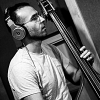
Makram Aboul Hosn
bass, acousticTotally at home with the jazz cannon, it was his immersion in Arabic music in Beirut that brought home the innate power and meaning of music: "Playing folk music here was a huge wake-up call for me," Hosn told All About Jazz in 2019. "Playing folk music and watching two hundred people sing along is so powerful. It reminded me that music is a communal activity, not an intellectual, isolated activity. You've got to make people feel things."
Emotions are central to Hosn's coming-of-age album Transmigration (Self Produced, 2019), where one standard and nine original compositions underline Hosn's credentials as a composer, arranger and leader to be reckoned with. The spirits of

Thelonious Monk
piano1917 - 1982

Charles Mingus
bass, acoustic1922 - 1979

Sun Ra
piano1914 - 1993
"Mine Or Blues," a pulsating Monk-cum-Mingus mash-up, features
Tom Hornig
saxophoneNidal Abou Samra
saxophoneKhaled Yassine
percussionChristopher Michael
drums
Joe Locke
vibraphoneb.1959
Joe Aouad
An equal appreciation of Middle Eastern music, classical Baroque, jazz and African rhythms informs the playing, composing and arranging of guitarist Joe Aouad.Aouad can be found in a duo with Japanese flute/shinobue player Nobuko Miyazaki, mixing their original compositions with personal takes on traditional Arabic and Japanese songs. With singer Scarlet Mounzer Aouad explores the Brazilian songbook. In the MoniQuartet Aouad filters pop and rock through a jazz prism—bossa nova Metallica anyone? On whatever the project, Aouad leaves his indelible and most elegant imprint.
In February 2024 Aouad's arrangements of popular Italian songs from 1940-2000 took wing at Metro Al Medina, where the guitarist was joined by Italian singer Alessia Squarcella, bassist Makram Aboul Hosn, tenor saxophonist Tom Hornig, drummer Kevin Safadi and trumpeter Simon Salameh. Colored by both jazz and Arabic tones these are fresh takes on much loved Italian songs. A recording of the concert is available on Bandcamp. This video sees Aouad in a solo setting interpreting his beautiful original composition "Waltz The Time."
Bonne Chose
One of the most progressive of contemporary Lebanese outfits is the trio Bonne Chose. It should come as no surprise that bassist Charbel Sawma (who also doubles on synthesizers), pianist/keyboardist Rami Abou Khalil and drummer Abdo Sawma sound so tight, so attuned to each other's wavelengths, as the three are childhood friends who discovered together the musical roots and branches that inform their music.Jazz is just one thread of Bonne Chose's music. Arabic song, jazz-fusion, improv, prog—all this and more shape the contours of Bonne Chose's enticing musical landscape.
Only In Lebanon!
Along with all the other challenges faced by the Lebanese is the frequent inconvenience of power cuts. In August 2024, the Lebanese state electricity company—which provides just four hours of electricity per day —announced that fuel supplies of its only operating power plant were exhausted. This news came with the warning that even essential services such as the airport, sewage systems, the seaport and water pumps, along with everything else, would be affected. The government advised people to save all the water they could.Plus ?a change plus c'est la m®Їme chose, the Lebanese must be thinking. Total blackouts have happened before. In 2013, Arthur Satyan (keys), Makram Aboul Hosn (bass), Rima Abou Aoun (vocals) and " data-original-title="" title="">Fouad Afra (drums) were swinging Antonio Carlos Jobim's "One Note Samba" at Nova when a power cut plunged the room into darkness. Afra kept on soloing and the band played on. "Only in Lebanon!" someone is heard to shout.
Only in Lebanon.
Tags
Comments
PREVIOUS / NEXT
Support All About Jazz
 All About Jazz has been a pillar of jazz since 1995, championing it as an art form and, more importantly, supporting the musicians who make it. Our enduring commitment has made "AAJ" one of the most culturally important websites of its kind, read by hundreds of thousands of fans, musicians and industry figures every month.
All About Jazz has been a pillar of jazz since 1995, championing it as an art form and, more importantly, supporting the musicians who make it. Our enduring commitment has made "AAJ" one of the most culturally important websites of its kind, read by hundreds of thousands of fans, musicians and industry figures every month.





 Buy Now
Buy Now




